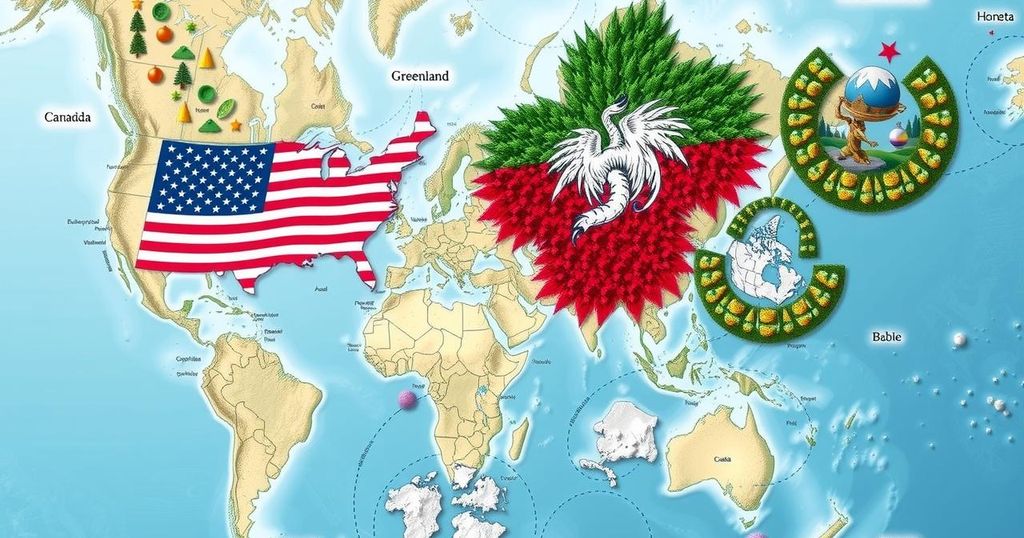Trump’s Provocative Expansionist Remarks Spark International Controversy

Donald Trump has expressed interest in expanding U.S. territory by suggesting the acquisition of Canada, control over the Panama Canal, and the purchase of Greenland. His comments evoke historic expansionist ideologies while prompting strong reactions from foreign leaders. The suggestions reflect a nationalist agenda amid broader international relations challenges, particularly concerning drug cartels in Mexico.
President-elect Donald Trump has been vocal regarding potential territorial expansions for the United States, suggesting the integration of Canada as the 51st state, a takeover of the Panama Canal, and revisiting the idea of acquiring Greenland from Denmark. His remarks have stirred debate about their authenticity, presenting a blend of serious policy propositions and provocative statements designed to engage media and amplify his support base. Trump’s commentary, particularly regarding the Panama Canal, suggests a desire to assert U.S. influence in the region once more, paralleling historic expansionist ideologies.
Amidst these developments, Trump also indicated a controversial plan to designate Mexican drug cartels as foreign terrorist organizations, which could set the stage for military action on Mexican territory. Such proposals, reflective of a nationalist approach characterized by ‘America First’ rhetoric, raise significant concerns regarding international relations and sovereignty.
Responses from foreign leaders have been dismissive, particularly towards Trump’s claims about the Panama Canal, as Panama’s President made it clear that sovereignty over the canal is “not negotiable.” Meanwhile, the Danish administration reiterated that Greenland is not for sale, emphasizing cooperation over acquisition. Trump’s recent remarks regarding Canada appear to be less serious, serving instead as a playful jab at Prime Minister Justin Trudeau following a meeting at Mar-a-Lago.
The article discusses President-elect Donald Trump’s recent provocative statements regarding the potential expansion of U.S. territories, aiming to absorb Canada, regain control of the Panama Canal, and obtain Greenland from Denmark. This discussion is situated within a framework of nationalist rhetoric and historic notions of American expansionism, contrasting with his earlier campaign positions advocating for reduced foreign intervention. The reactions from respective countries highlight the contentious nature of Trump’s propositions and suggest a complex relationship between U.S. policy and foreign diplomacy during the transition to his administration.
President-elect Trump’s entertaining of potential territorial expansion reflects a mixture of political strategy and nationalistic sentiment, drawing parallels with historic themes of American expansion. His provocative statements concerning Canada, Panama, and Greenland have elicited definitive counter-responses from the affected nations, emphasizing principles of sovereignty and cooperation. These developments set a contentious stage for international relations as he prepares to assume office, challenging traditional diplomatic norms and raising important questions about the implications of such U.S. ambitions.
Original Source: www.cnn.com







